#they activate so many neurons in my brain
Text





#sobbing screaming on the floor#THEM#they activate so many neurons in my brain#twisted wonderland#twst#my art#twst deuce#twst jack#jack howl#deuce spade#jack x deuce#jackdeu#jackdeuce#how do you even tag them help#also jack would more likely drag deuce out for a run when deuce is in a bad mood#ill draw that another time#be prepared for one or 2 more jackdeuce drawings before i go back to the other characters#head empty only them
509 notes
·
View notes
Photo






#james jude courtney does such a good job as michael#the way he walks down steps reminds me of how nick castle did it#and it activates SO many neurons in my brain#movies#john carpenter's halloween#halloween kills
18 notes
·
View notes
Text
@caracello How does it feel to have such a gigantic brain
(Please reblog! I like reading tags :] )
#🐉🎮.txt#clare's art#clare's animatics#i swear it must be heaven's light 😇⚔️#blood tw#kinda.#THIS SONG ACTIVATES NEURONS IN MY BRAIN. I LOVE IT SO MUCH#i can't think of. many other tags i'll just let this speak for itself
3 notes
·
View notes
Note
Holding on to Ganyu's horns while she breeds you again and again and again, to ground yourself, not realizing they're so sensitive that its driving her on...
Breeding kink with Ganyu? And Ganyu is doing the breeding 😍
Hold on. This is activating so many neurons in my brain rn. Ganyu just holding you against the bed as she rams her cock inside you, eager to fill you up and have a “kid” with you (get it because she’s a goat?) only to keep getting turned on because you keep accidentally stroking her horns…
It’s not your fault that Ganyu is surprisingly thick when it comes to her girth, so much so that you had to instinctively grab her horns to stabilize yourself. Not realizing that grabbing her horns was like the equivalent of stroking a private area for Qilins, and poor Ganyu kept getting turned on to the point she gets continuous erections inside you 😭
She’s already bred you full like…four times now, but it seems like the Half-Qilin is just too insatiable every time you stroke her horns. So just lay there and let her try to calm herself down. Maybe this time you’ll figure out not to touch her horns during mating season again 😅
492 notes
·
View notes
Text
Secret Sacrifices // Jake Seresin
Chapter One: [Mermaids Don’t Exist]
Summary: Jake continues to plays your knight in shining armour when tensions rise between you and an overly intoxicated patron. Bob brings up a mutual memory.
Warnings: Jake Seresin x F!reader. Witness Protection F!reader. Sexually degrading comments made towards reader. Sexual tension, trauma. Mentions of death & violence.
Word Count: 3.5k
Author Note: Still not writing as much as I once was but I’m getting back into the swing of things. Any comments, thoughts or concepts are welcome!
Series Masterlist | Main Masterlist


Dreams mainly occur when the body falls into a stage of sleep referred to as R.E.M. Rapid eye movement occurs when the brain and body are finally able to completely rest. But that doesn’t necessarily mean that when your body is able to rest, it allows you to do so.
“We’ll find you, Y/n!”
Nightmares are typically thought to be an evolutionary conserved trait. Some researchers believe that nightmares provide a rehearsal for life-or-death situations. Before you lived one? You would have said something along the lines of ‘that checks out.’
“No no no no please, Patrick, stay with me—“
Some researchers believe nightmares to be a practical experience for many people as it allows the brain to run through multiple different algorithms to find the most desirable strategies, and solutions to often critical and complex situations.
From a procedural standpoint, simply imagining doing an action can improve your performance.
“I love you—take Charlie.”
This applies when we simply imagine doing an action such as playing the piano or running for your life after being run off the road, it activates something called a mirror neuron.
“You have no idea what you’re dealing with here, girly.”
In theory, the more nightmares you have, the more of those algorithms your brain is able to run, and the more prepared you’re likely to be for the daily struggle of survival.
But evolution herself is seen by the scientific community more so as a tinkerer than as an inventor.
“Oh god—please, not my baby, please! Someone! Help us!”
So, that’s probably why you have the same nightmare over and over and over again every single night.
Every morning you wake in the same way, with your face pressed into your pillow and your chest sinking into your mattress. Secretly, every morning you wished that your pillow would have suffocated you in your sleep so that today would forever be unobtainable. But you couldn’t do that, no. Not when the only way to bring a sense of worth to your life was to keep putting one foot in front of the other.
With a groan and a look that spoke volumes to your lack of self-esteem, you rolled onto your back and let out a heavy sigh. Your hands were quick to shield your eyes from the mid-afternoon rays beaming into your bedroom via the slightly cracked windows.
“Your name is Y/n Y/l/n, you are doing the right thing.”
Guilt and grief aren’t linear emotions. They don’t have a perception of how much time has passed. Realistically it had been three years, six months, and two days since your entire world had been flipped upside down. But every morning, after seeing your husband bleeding to death as he sat pressed against the steering wheel, and having held your five-year-old son in your arms while he took his last breath, the wound was reopened.
And the clock always resets.
“Ah, there she is.” You couldn’t help but hang your head in shame almost. Penny’s glare from behind the bar was as piercing and sharp as it was endearing and playful. Like a woman who took no shit from no one. “You know, you’d think management would be here on time more frequently than whatever the hell this is.” All you could do was take the semi-serious scattering from the owner of the bar you’d been lucky enough to be set up with a pretty good gig at. “Get over here and give me a hand will ya?”
“Sorry, Penny—” There wasn’t much more you could say to justify yourself. You woke up late, got ready slowly, and got lost in the steam of your mid-afternoon shower as you fought off the existential dread that was your current situation. “Flat tyre,” You shrugged like it wasn’t that big of a deal that you were currently twenty-three minutes late for your shift, “I’ll make it up to you.”
“Yeah well, you can start by clearing off the table by the piano,” Penny smiled as she nudged her head in the direction of the unruly table of patrons that had surely had far too much to drink. “Think Rick’s had a little more than his liver would care to admit.”
“Yeah righto,” you sighed as you came behind the bar, doing up your apron as you looked around at the utter mess that had become the place. “I’ll sort him out.”
North Island wasn’t somewhere you ever saw yourself living, but that was the real kicker in all of this. You didn’t mind the picturesque town with clear blue skies and water that mirrored it. But being the outsider, being the new resident, being the Hard Deck’s newest manager was all some of these people saw you as. Six months in a small Naval town was barely a dint in the years some of these families had been living here.
“Aw hello, Brewer!” Rick Spencer, the resident rioter, cooed as he beamed your way. For someone in their mid-sixties, he surely went alright. “What brings you in on this fine Saturday afternoon?”
Typical - If you could have, you would have rolled your eyes so far into the back of your head you would have fallen over. Instead, you chose to smile and settle into the nightlife festivities with a can-do attitude and a rather cheeky smile.
“Came to check on you, Spence? How’s everything over here boys?” It wasn’t uncommon for you to entertain the banter most of the patrons would give you. Most of the locals had caught on quickly that you enjoyed a good laugh every now and again but also knew how to handle your own.
But there's always one in every group, isn’t there?
“Would be a hell of a lot better if the barmaid was a little more topless! Right boys!?” A man you hadn’t seen before interrupted before a roar of ‘yeahs’ and agreements were made. Fists and beer bottles along with spirits alike slammed against the tabletop. “Come on girly—” The man continued as you stood there holding the empty bar tray, ready and waiting to collect the empties that littered the table. “Get your kit off.”
“I don’t think so, boys,” You politely declined the offer of public indecency. “Perhaps in another lifetime.”
“Sorry about him, Brewer,” Rick explained as he shook his head and stood from his seat at the booth. “My nephew’s here for a few days.”
“Yeah well, so long as he remembers I run the joint and can have him tossed any time,” You replied sternly. “Keep him in line, Rick.”
“Oh come on now, sweetheart, I was only joking!” The man you only knew as the nephew chuckled as he overheard your comment. “It’s slim pickings around here anyway, you just look like the best of a bad bunch is all.”
“Hey!” That voice, that far too familiar voice echoed through the crowd. “You speak to her, or any woman for that matter, like that again? So help me god I’ll punch your teeth right through the back of your skull.” Jake snarled as he came to stand in front of you with his back nearly pressed right into your chest. “Got it!?” The close proximity, the overwhelming aroma of the familiar cologne, and the notes of burnt orange and bourbon made your heart warm. It all had your heart beating against your chest with a force so intense you thought it might break through.
“Yeah right,” the man only known as the nephew agreed. “Sorry, sweetheart, I’ll get on the waters for a while.”
“That and a pretty big tip should call us even,” you added with envy conviction laced in your voice that you even had yourself fooled that everything was alright. “Let me just grab these empties for you fellas.”
You didn’t mess around with it, you simply let the group fall back into their regular chatter as you filled your tray.
Jake stood with crossed arms a little off to the side, eyeing off all the men who sat idly. Fucking pricks.
“Been here all of five fucking minutes—” Jake could sense your frustration as you turned into him. At first, he didn’t move, he simply stood there drinking you in as you held the now full tray of dirty glassware.
“You didn’t have to do that for me,” was all you said.
With wandering eyes, Jake didn’t miss a single inch of you.
“I know,” Jake smiled softly as he reached around to lead you back to the bar for a moment to decompress. His hand gently fell to the small of your back as you walked side by side, “I know you’re capable of taking care of yourself, but just because you’re capable? Doesn’t mean you have to go it alone.”
Alone, that’s all you’d ever been for the last three years.
“Yeah, yeah I guess you’re right,” the sigh that left your body allowed your shoulders to relax as you placed the tray onto the bar and slid it over for Penny to take. “Thanks, Jake, I owe you one.”
Jake Seresin had never been the kind of guy who saw himself settling down. But when he first saw you, that thought hadn’t left his mind.
“Name a time and place,” Jake teased as he sent you a wink. It didn’t take Jake long to find himself at home up by the bar, perched on one of the bar stools as he entertained his favourite bartender. “I’ve always wondered what our first date would be like.”
“Do I look like I came down in the last shower, Seresin?” You knew Jake had a thing for you, it wasn’t all that hard to put together. But it could never work, not in a million years. Not when you were playing pretend on a professional basis.
“What’s that even mean?” Jake asked as he leaned his elbows on top of the bar, grinning ear to ear as he pressed your buttons more.
“It means—“ You cooed as you leaned into his space, making it known that the flirting was welcome, but the end goal wasn’t in sight. “I know you’re just trying to get in my pants.”
“Pretty good-looking set of pants if I do say so myself,” Jake teased as his eyes trailed down the expanse of your body, then back up. Those emerald cities of his were full of complex wonder and undoubtable loyalty. Something you could never give back. “But despite the fact I think you’re pants would look a hell of a lot better in a pile on my bedroom floor, I’m not just doing any of this for a chance to, well, you know what I mean.”
You did know what Jake meant, and for all intents and purposes you could admit to yourself that it sounded very tempting. But you knew what the repercussions would be.
“Jake, that’s all very sweet of you,” you felt as if you had this very conversation every week. The gentle let down. The kind-ish conversation where you reminded the overly-confident and somewhat self-assured Aviator that you weren’t looking for love or lust, or anything. Besides, there were already too many people looking for you. “But you know, as much as I think you’re a good guy and friend, I’m not interested.”
Jake stood silently before you, drinking in all that was you. From the lines etched into your forehead to the small scar that ran through your left eyebrow. He wasn’t listening, there was just something about you. Something so intriguing that he couldn’t stop trying to win you over. He couldn’t stop trying to get you to give him just one chance. One chance was all Jake wanted to convince you he wasn’t everything he knew people had told you he was.
“What would you say if I asked you to–” Before Jake had a chance to finish his question, the echoing sound of a glass shattering into smitherings against the wooden flooring, interrupted his train of thought.
“OOOIII– TAXI!” It was almost as if all the patrons, besides Jake that was, had all congealed into one as they yelled shouted and cheered towards the man who had dropped his glass. With a heavy sigh and a quick roll of the eyes, you knew you would be the one who ultimately had to clear the mess.
“I should probably get back to work.” The silence that came from Jake was deafening as you pulled away from where you had been standing far too close to a man you thought you didn’t want. A man you couldn’t have even if deep down you really wanted. Life was unfair like that. You couldn’t have anything you wanted, anything you loved. Anything that made you happy in the smallest of ways.
“There’s really no chance of getting you to agree to just one date, is there Brewer?” Jake watched as you made your over to where you kept the cleaning supplies in a small section behind the bar.
“If you already know that then why do you constantly make such an effort?” It was the look on your face that told Jake everything he needed to know. There was no chance in hell he was ever getting that date.
But Jake Seresin never gave up without a fight, and he sure as hell wasn’t about to now.
“Because you gentled me, Brewer,” Jake Seresin had never been the type of person who wanted to settle down. He was always so content with the relations he chose to have and the way he chose to have them. Short simple quick flings. Girlfriends who lasted no longer than a year and one-night stands he’d promise to call but never got their numbers. But then there was you. “No one’s ever done that before.”
“Please don’t put that on my shoulders, Jake,” You weren't sure how to respond to that, how to process that kind of admission. “Just lay off the heroics for a while alright? I don’t want people getting the wrong impression.”
“That impression would be?” Jake questioned like you’d just insulted his very being. That it would be a crime to love him.
“Jake, I have a job to do alright,” It wasn’t that you were angry or upset that Jake cared for and about you. It was more frustration on your part for not being able to act on your own feelings towards him. It had been three years since your husband died. Three years since you felt the loving embrace of another human being. That alone was enough to frustrate anyone. “Please, just–just, I need to get back to work.”
The thing about nightmares is that they often don’t stick to their own parameters. Sometimes, you end up living a nightmare more often than you dream one. Right now? As Jake looked at you like you’d just shot him through the heart, you knew you were wide awake. Living a nightmare that continued to punish only the good.
“You’re untouchable,” Jake sighed to himself softly as he shook his head in defeat. “The untouchable woman who won’t let anyone in, you’re too proud or something aren’t you?”
“It’s just–” All you wanted to do was explain yourself, pull Jake aside and let him in on why you couldn’t allow him to love you the way you wanted him to. But no words came out as you stood there holding the old dustpan by your side.
With every blink, you saw flashes of Patrick. The love you lost too soon, too suddenly. He made sure to haunt your dreams to keep you safe. For a brief second of all-consuming anguish, you saw him too. Standing right behind Jake, warning you not to. “I need to get back to work, I’m sorry.”
“Right,” Jake clenched his jaw when he felt the word vomit about to spew from his lips. He wasn’t mad, rejection just wasn’t something he was familiar with. “When you get a chance, put a Budweiser on Bradshaw’s tab.” Jake pressed his lips together into a fine line of regret, instantly kicking himself for pushing. He knew he shouldn’t have, but the chase was as addicting as it was thrilling. With a simple knock of his knuckles on the bar before, he turned on his heels. Leaving you to stand there in your own self-loathing.
Your heart sank as you watched Jake shove his hands into the pockets of his jeans with a head that hung so low you almost wondered if his neck would be sore. Guilt, shame, it all felt the same. But you couldn’t let Jake in, you couldn’t allow him into your life more than what you’d given him over the last six months.
You’d tangled yourself in barbed wire so you couldn’t be reached by anyone. Unknowingly bleeding when as it digs into you more and more. You would think the touch of skin on yours wouldn’t be so terrifying, but you’d been bruised before. You couldn’t allow Jake to fall into your web of lies that kept you safe from harm’s way. If hurting him was the only way to keep him safe, you’d hurt him twice over every single day.
Perhaps it would be safer to stay the untouchable woman.
***~***~***~***~***~****
As a child, there was magic in the mundane. You often found yourself missing the mermaids among the koi in the pond, their glittering scales reminiscent of a childhood fairytale. Summer mornings you’d make bouquets out of the same flowers adults would now mow away while wrinkling their noses at the weeds.
You often wondered to yourself when the awe of the day-to-day faded away and when you stopped believing in your ability to see mermaids in the momentous world around you.
“Another round fellas?” You tried not to think too much about the way Jake’s eyes burned into you like a fiery sunbeam as you stood behind Rooster. “Same old same old? The usual orders of Bradshaw’s table?” The squad, affectionately known as the Daggers erupted into laughter all the while Rooster remained silent and brooding.
“You are all bleeding my dry,” Bradley sighed as you made the rounds and collected all the empties onto your bar tray. “Seriously, I know you aren’t all working for free, cough up.”
“You could– just apologise for being a Neanderthal and I’ll close it out?” Your statement left a bad taste in Rooster’s mouth, he wasn’t one for apologising for things he didn’t think he’d done wrong.
“I could,” the brooding moustache-having man replied. “But it’d be an empty lie.” There was something about Bradley Bradshaw that made the hairs on the back of your neck stand to attention. He wasn’t necessarily a bad person, he was–an only child. He probably never imagined mermaids among the koi.
“Appreciate the honesty there, Bradshaw,” you chuckled deeply as you finished you collecting all the empty glasses and beer bottles. “Guess the next rounds on you.”
“Here here,” Coyote chimed in with a Cheshire Cat grin. “All in a hard day’s work there Rooster, you always know how to piss off the barkeep.”
“Works out in our favour,” Bob smiled as he passed you two empty glasses. “I don’t think I’ve paid for a drink of my own in a few weeks now.”
“No, you just keep trying to convince everyone Brewer here was your first kiss,” Phoenix smirked as she finished off her beer.
All the air inside your lungs felt like they had been sucked right out. The chills that ran down the expanse of your spine made your blood run cold. You stood tall with your now full tray of old beer bottles and empty glasses and sent a polite smile Bob’s way.
“You still riding that wave?”
“You just really look like Y/n from Nurellun Public,” Bob countered with an almost pleading tone. “She was my first kiss by the sandpit and I remember she had a little yellow dot in her right eye.”
“Brewer has a yellow dot in her right eye,” Jake decided to enter the conversation from his place in the corner of the booth. “Tell you what Floyd, you must have been one shocking kisser if you got Brewer here to change her damn name.” The table erupted into a loud boisterous laugh as the Weapons System Officer sunk a little lower into his seat.
You felt for Bob, being the butt of the joke was never a good feeling. But when your case officer relocated you to North Island, he didn’t bank on one of its locals being your first snog. You hated gaslighting the guy, but you had no other choice. Bob Floyd had to stay in the era of Meridamis and weed bouquets.
“Like I told you last time Bob, you’ve got the wrong girl,” It was as nonchalant as it was dismissive. “My first kiss was with Johnny Bennett out at some random guys shed.” You had gotten used to lying about your life and who you were. At the very beginning it was almost impossible, but three years on? You’d gotten pretty good at playing pretend.
Only you wished it could be with the mermaids in their fairytales. But much like all those mermaids and all those fairytale stories……you didn’t exist. Much like Johnny Bennett. 
***~***~***~***~***~
Tags: 🏷️ @a-reader-and-a-writer @xoxabs88xox @hiireadstuff @buckysteveloki-me @athenabarnes @els-marvelvsp @blindedbythelightt @tayl0rhuynh @na-ta-sh-aa @kmc1989 @sunlightmurdock @mamachasesmayhem @jaxfart @lauenderhaze @sugarcoated-lame @maisie-rebloging-blog @captainmoonknight @seitmai @shanimallina87 @kajjaka @imnotcreativeenoughforthisblog @imladrisofabookdragon @buckysteveloki-me @mrsevans90 @allepaula @els-marvelvsp @djs8891 @paperbag33
#secret sacrifices // jake seresin#jake seresin x reader#jake seresin x you#jake seresin x y/n#jake hangman fic#jake hangman imagine#jake hangman seresin#jake seresin fanfiction#jake seresin imagine#top gun hangman#top gun fandom#top gun fanfic#top gun fanfiction
265 notes
·
View notes
Note
suaropods on earth are the absolute upper limit for land vertebrates, but is it because they have four legs? cause i was working on a scifi spec evo idea where the endoskeletal vertebrate-analogs have eight legs and it got me wondering if it means their sauropod equivalents can be even bigger in a similar earth like gravity
If it was just about leg numbers then land mammals wouldn’t be smaller than the biggest dinosaurs
In reality you need specific evolutionary pressures, circumstances, and unique and efficient anatomy to get big.
For sauropods it was entirely due to their internal anatomy. Sauropods are saurischian dinosaurs, which have hollow bones with internal scaffolding that likely made them stronger than if they were solid, as well as a very extensive respiratory system that included numerous air sacks, many of which ran through their bones. This ultimately allowed saurischian dinosaurs to massively cut back on volume and allow them to cool off easier and have more efficient respiration. There’s things we still don’t know about sauropod anatomy though such as how their circulatory systems combated their sheer verticality. Dinosaurs also have unidirectional respiratory systems, which is more efficient than mammalian two way airflow.
For modern baleen whales it has more to do with the aftermath of the last ice age and how it impacted the location of their food (keep in mind this explanation of the evolution of baleen whale size is based on my current understanding and might not be correct). Baleen whales actually used to be much smaller, around bus size. But during and after the last ice age the ocean currents changed and krill populations became concentrated around the poles. Because of this, baleen whales needed a way to eat as much as possible in one sitting and travel long distances efficiently. The easy solution was to get big, which became easier as their predators the macroraptorial sperm whales and Otodus megalodon gradually went extinct. A thing to note however, is that because they need more resources due to their size, the number of baleen whale species is lower than it was several million years ago. Also also, blue whales are getting bigger.
On earth, 200 tons is more or less the maximum size for animals, as the biggest whales, ichthyosaurs, and sauropods got around that size.
There’s more things to note though:
No, higher oxygen levels don’t make things bigger. Not even bugs. Modern arthropods are actually on average bigger than their Carboniferous counterparts, and the oxygen levels were way higher back then. And griffinflies, very active flying insects, lasted all the way into the Permian, when oxygen levels were lower than in modern day.
It’s important to consider what the bones of animals are made of as well as their structure. Different internal structures can handle stress better, and different materials can handle pressure differently.
Eight legs might be too many, as having more legs, while very stable, can be more energy costly. Two legs might not be able to support as much weight as four, but it is more efficient.
A very big thing animals have to fight with when it comes to size is something called the square cube law. Basically as something gets bigger its volume (insides) increase way faster than its outsides (surface area). If you had a 1 centimeter cube and doubled its size, the surface area would quadruple but the insides would increase eight times. But there are ways of combating this such as decreasing volume with things like air sacks or increasing surface area by being very wrinkly (that’s how human brains fit so many neurons!). And because things with a metabolism generate heat, big animals have to combat overheating because they have a lot of insides. That’s why elephants have such big vascularized ears and why their skin acts like a sponge to soak up water.
Also I have no idea how perucetus got so big, that glorious fatass
#ask#questions#anon#anonymous#biology#paleontology#palaeoblr#speculative evolution#speculative biology#speculative anatomy#speculative zoology
188 notes
·
View notes
Text
Kinktober Day 3 - Hate Fucking / Thigh Riding
For Kinktober day 3!
Sukuna Ryomen x AFAB!Reader
Content warnings: AFAB reader, thigh riding, spitting, PV sex, hate fucking, body swap, degradation, swearing, slapping/impact play, biting, unprotected, name calling, dacryphilia, light cheating (kinda?), choking
18+ MINORS DNI
More under the cut!
The painful sting of your palm is harsh enough to static out the panic that is frying the neurons in your brain as you watch Sukuna rub at his jaw in shock. You don’t usually make it a habit to slap the shit out of people you despise - even people you despise as much as you despise Sukuna - but the string of obscene swear words that fell from your mouth overtook your body and before you knew it, your open palm was swinging with all of its might towards his cheek, and the strike reverberated hard through both of you before you could stop yourself.
See, you have no allegiance to this…thing masquerading as a human. Your allegiance was to your long time boyfriend, Yuuji Itadori, and unfortunately, the two of them came as a package deal, one that only seemed to ever inconvenience you. Sukuna had a habit of showing up at the worst possible times. When you had Yuuji meet your parents for the first time, it wasn’t until the overhead light of the chandelier in your family home’s entryway hit his eye just right that you realized Sukuna had taken over just to fuck shit up, and now your mom prays nightly that you’ll find a “good man” unlike your current boyfriend sooner rather than later. Or when Yuuji was your plus one to your best friend’s wedding, and then Sukuna showed up too many drinks into the night and ended up causing thousands of dollars of damage to the venue for the bride and groom. And you two don’t even discuss the time Sukuna took over during that cruise you booked months in advance that caused both of you to be banned from maritime activities in the Pacific Ocean.
Needless to say, Sukuna solely exists to ruin your life.
So tonight, when all you wanted was to celebrate your anniversary with Yuuji at the way too nice restaurant that you made reservations at on your last anniversary, when Sukuna takes over with that sly fucking smile and that I’m-better-than-you squint, something in your brain finally snaps. That’s how you end up standing in your dimly lit apartment, hand burning in pain, and a red mark appearing on Sukuna’s cheek.
Oh my God, he’s going to kill me. You think to yourself in the molasses slow moments that tick between him popping his jaw and locking eyes with you.
You’ve never given much thought to how you were going to die, and you’re not the protagonist of a wildly successful young adult fantasy romance novel from the early 2000s, so now’s not the time to wax poetic. In fact, the only thing going through your mind as you feel Sukuna grip your neck and throw you back against the nearest wall hard enough to shake the pictures from their nails is that Yuuji is going to wake up, regain control of his body, come back to the moment to rescue you only to see your lifeless body on the floor. He’ll blame himself forever, and it is the saddest thought you’ve ever had.
“You fucking bitch,” Sukuna all but screeches at you, and a fire ignites behind his eyes, burning with fury you’ve never seen from him. He’s usually so calm, so cocky in his strength, but something about you seemed to have set him off as much as he set you off.
Continued on AO3...
#x reader#fanfiction#smut#kinktober 2023#kinktober#creative writing#writeblr#veroniquesboutique#sukuna#ryomen sukuna#sukuna ryomen#jujutsu kaisen#jjk#sukuna x reader#sukuna x you#sukuna x y/n#sukuna smut#jjk smut#jjk x reader#jjk anime#jjk sukuna#female reader#x you#x you smut#fem reader#cw sex mention#cw smut#tw sex mention
117 notes
·
View notes
Note
I saw fluffy Floyb in the tags and many neurons activated in my brain👁️👁️
I feel like you've been asked this already but may I ask what the general plot of the fwb Floyb will be...I need any Floyd crumbs I can get to keep me sane until you write another fic for my boy🛐
I love your writing so much btw!! I gobble up everything you write, even if it's about media I don't really engage with. I'm actually thinking of going back to Genshin because of your Scara adoration. The Mera effect is real.
👁 👁 fluffy Floyb also activates the neurons in my brain every time hehe. There's just so much potential with him in fwb situations!! I haven't thought of any concrete ideas yet, but I did write an idea here. Although I feel as if the stakes aren't as exciting as the stakes in Contractual Codependency and tmdg. orz but maybe it doesn't have to be extreme! I'll continue to think up yummy concepts for our beloved Floyb!!!! <3 aaaa but it would be fun to write a fwb fic based off of this Floyb meme:
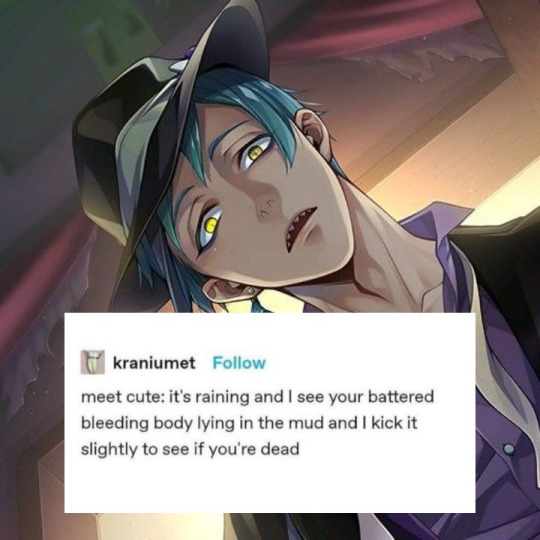
:D thank you for enjoying my writing omg!!!! I'm happy you can feast on the other media I write about as well! The Mera Effect LOL,,,, this is very true! No one is more beloved than mouchey. I need to write more for him (and the other characters as well, especially the Fontaine cast)!!!!! There are many mouchey ideas bouncing around within my brain. He's too perfect. (´▽`ʃƪ)♡
#twisted chit chat#i hope you will enjoy genshin if you ever return to it!!!! <3#the fontaine arc was amazing OTL
68 notes
·
View notes
Note
i need to stuff mams in a locker /affectionate
he’s such a lame dumbass i love him so much he’s my bbg. need to do so many things to him (and for him)
for a single shot at having domestic and cozy and cute vibes with him for one night i would kill a man, a demon, literally anything.
i see him and my one neuron activates. i need to see him every which way. all ways. any ways. yes please.
GOD. i am normal. he makes me normal.
(also i’m the one who requested the #5 in the list LMAOOOOO)
OHHHH SO IT WAS YOU WHO REQUESTED NUMBER 5, HELLO WELCOME BACK LOL
You 🤝 Me
"saying 'thats gay' affectionately"
ALSO YOU ARE SO REAL FOR THIS ME TOO LMAO. Mammon is so goofy, like bro i wanna pick apart his brain(not that I havent already done this)
hes so sweet too and tbh it makes me so sad that I'll probably never find someone like him but its okay im here writing fics thats my copium.
dude ur just like me frfr
26 notes
·
View notes
Text
chemical imbalance
L x gn! reader | fluff
a/n: i want to cause a chemical imbalance in his brain so badly

“it seems like you have caused a chemical imbalance within my body.”
your head whipped towards L at his random outburst. it wasn’t unusual for the man to ignore social cues, or be wholly inept and unaware of the clues at all, but this sentence felt different.
“ryuzaki, what,” you questioned, putting down some files regarding the third kira, “is this your way of saying you suspect me of being the second kira again? we have already proven misa was the second kira.”
if this were another accusation, you would probably rip your hair out of frustration. you suspected light of being the first kira - more like knew he was after he randomly gained misa amane as a “girlfriend.” understandably, your connection to light made the notorious L wary of you being the second kira - the idea of childhood friends sticking together wasn’t one he could rule out. thankfully, misa’s sudden appearance cleared your name - though, the detective wanted you to stay with the task force for the time being to prove you had zero relation to the case. L also valued the fact that you could push your emotions aside and try to help solve the case, something he grew to appreciate more when soichiro finally accepted your word against light’s and viewed his son as a possibility.
“frankly speaking, the likelihood of you being kira at some point in time will never be completely zero,” L calmly stated, his teeth barely brushing against his calloused thumb, “however, this is not directly about the kira case.”
“oh?”
you couldn’t help but tilt your head slightly, wondering what he meant. it wasn’t unheard of for you to be stumped by the man deemed the world’s greatest detective (the world’s top three greatest detectives apparently) but something told you this was different. to be honest, you didn’t even think he had the capacity or desire to think about anything beyond the kira case. he spent dollar after dollar, risked life and limb, and even resorted to morally grey techniques to get this far…the idea of him focused on anything else seemed absurd.
“my ventral tegmental area started producing dopamine around you.”
“uhm,” you hummed aloud, “am i supposed to understand what you mean?”
the detective only let his shoulders sag even more, seemingly annoyed he had to explain to you further. L greatly understood that there was a price for everything but he couldn’t help but feel aggravated at times when he had to explain himself. it was an easy deduction in his mind, one so simple that an explanation shouldn’t be needed. there was also a nagging in his mind that was not from intellectual superiority. a nagging that felt like he shouldn’t explain himself for fear of actually being understood. logically, it made sense for him to want to fault you for the feelings that have risen inside of him but his heart was suddenly trying to sway the detective’s reasoning. human emotions are such fickle things, always hindering the logical capabilities of the species is capable of.
sentience lies within emotions. that is what made humans scientifically the better species, as many researchers like to argue, but L felt as if it was the opposite. his owlish eyes only glinted in them when he knew he has won a game, his childish nature only appearing at times when others would deem it insignificant. L did not need emotions to hinder him. he saw the way soichiro looked over at his son with loving eyes and a strong sense of familial connection, completely ignoring the fact that his son is a likely candidate for the world’s most wanted. L did not want to be blinded by emotion, but it was not in his nature to go down feebly.
“dopamine plays a huge role in addiction miss y/n. it jumps from each of our neurons and builds a pathway for the stimuli to take over our whole brain. then the nucleus accumbens increases the production of dopamine. this causes the adrenal gland to become active which manufactures adrenaline and norepinephrine; our flight or fight response is now present - though i suppose it is now flight, fight, freeze, fawn, or submit. do you understand where i am leading,” L tilted his head, his owlishly dark eyes gazing straight at yours.
you honestly understood maybe seventy-five percent of what he said at most. you would look around the room to get help from others — a common occurrence as no one could keep up with the eccentric detective — but it was just you and L present at the moment. typically, these small moments between the two of you were interrupted by a discovery or watari bringing snacks to help the both of you focus. you liked the idea of the aloof man beside you speaking and interacting like normal, as normal as he can get, but you were beginning to feel a little frustrated by his statements. for one, they made you feel incredibly stupid as you couldn’t process the words he was saying at the speed at which he did. secondly, you were close to finding a link to the third kira but that was now lost in your mind as the detective managed to garner all your attention. and lastly, you were irritated by how pretty he seemed to be with the blue light from the screens radiating off his ghostly pale skin. the man who, although justified, is aiming to put her best friend behind bars. the man who uses moral grey but legal techniques to gain victory. the man who probably saw her as a pawn, maybe even a bishop if she was lucky, in this chess match constructed by him and light… the man who was beside you. this wasn’t a place for emotions but would you be human if you didn’t seem to show immense sentience at the worst times?
“ryuzaki, please speak japanese or even english - just not whatever this is,” you sighed exasperatedly.
L moved his thumb from his bottom lip and let out a small sigh, “you are clouding my judgment. when you are around, my frontal lobe doesn’t seem to be occupying at full capacity even when i sit the way i do. my amygdala seems broken; the idea of you being kira in any sense seems to be statistically plausible yet i cannot fathom it. you are hindering my detective work and my capabilities - though, i do not anticipate it as purposeful which is more frustrating. i think it would be safe to assume i have feelings for you.”
“romantic feelings ryuzaki? or platonic? no offense,” you started, seeing his eyes analyze your every move, “but you don’t seem like the type to be able to tell the difference.”
“if it was strictly platonic, my frontal lobe and amygdala would not be as hindered. it seems more plausible to me that these feelings are romantic.”
you could only stare at him, unaware of the heat rising to your face and your hands playing with themselves. you both knew this was not the time to build strong emotional attachments to one another but who were you at your core if not someone who yearned for affection?
“based on your reaction, i assume you feel the same way…or at least aren’t appalled by the idea,” L turned back towards the screen, a ghost of a smile on his lips, “we do not have to do anything about this at the moment, I rather have us both be safe from kira before we try to progress or discuss anything between us.”
you simply nodded before looking back at the files on the yotsuba group, pretending to focus as you try to gaze at the detective from the corner of your eyes. this wasn’t the time for romance but you both would try and make the time available as soon as possible. however, for now, you two would enjoy the comfort of knowing the feelings were mutual and that at the end of this path, someone would be waiting for you with open arms.
#death note x reader#death note fanfic#death note#lawliet x reader#l lawliet#l lawliet x reader#l x reader#ryuzaki x reader#ryuzaki#lawliet fanfic#l fanfic#fluff#oneshot#death note oneshot
185 notes
·
View notes
Text
Generative AI for Dummies
(kinda. sorta? we're talking about one type and hand-waving some specifics because this is a tumblr post but shh it's fine.)
So there’s a lot of misinformation going around on what generative AI is doing and how it works. I’d seen some of this in some fandom stuff, semi-jokingly snarked that I was going to make a post on how this stuff actually works, and then some people went “o shit, for real?”
So we’re doing this!
This post is meant to just be a very basic breakdown for anyone who has no background in AI or machine learning. I did my best to simplify things and give good analogies for the stuff that’s a little more complicated, but feel free to let me know if there’s anything that needs further clarification. Also a quick disclaimer: as this was specifically inspired by some misconceptions I’d seen in regards to fandom and fanfic, this post focuses on text-based generative AI.
This post is a little long. Since it sucks to read long stuff on tumblr, I’ve broken this post up into four sections to put in new reblogs under readmores to try to make it a little more manageable. Sections 1-3 are the ‘how it works’ breakdowns (and ~4.5k words total). The final 3 sections are mostly to address some specific misconceptions that I’ve seen going around and are roughly ~1k each.
Section Breakdown:
1. Explaining tokens
2. Large Language Models
3. LLM Interfaces
4. AO3 and Generative AI [here]
5. Fic and ChatGPT [here]
6. Some Closing Notes [here]
[post tag]
First, to explain some terms in this:
“Generative AI” is a category of AI that refers to the type of machine learning that can produce strings of text, images, etc. Text-based generative AI is powered by large language models called LLM for short.
(*Generative AI for other media sometimes use a LLM modified for a specific media, some use different model types like diffusion models -- anyways, this is why I emphasized I’m talking about text-based generative AI in this post. Some of this post still applies to those, but I’m not covering what nor their specifics here.)
“Neural networks” (NN) are the artificial ‘brains’ of AI. For a simplified overview of NNs, they hold layers of neurons and each neuron has a numerical value associated with it called a bias. The connection channels between each neuron are called weights. Each neuron takes the sum of the input weights, adds its bias value, and passes this sum through an activation function to produce an output value, which is then passed on to the next layer of neurons as a new input for them, and that process repeats until it reaches the final layer and produces an output response.
“Parameters” is a…broad and slightly vague term. Parameters refer to both the biases and weights of a neural network. But they also encapsulate the relationships between them, not just the literal structure of a NN. I don’t know how to explain this further without explaining more about how NN’s are trained, but that’s not really important for our purposes? All you need to know here is that parameters determine the behavior of a model, and the size of a LLM is described by how many parameters it has.
There’s 3 different types of learning neural networks do: “unsupervised” which is when the NN learns from unlabeled data, “supervised” is when all the data has been labeled and categorized as input-output pairs (ie the data input has a specific output associated with it, and the goal is for the NN to pick up those specific patterns), and “semi-supervised” (or “weak supervision”) combines a small set of labeled data with a large set of unlabeled data.
For this post, an “interaction” with a LLM refers to when a LLM is given an input query/prompt and the LLM returns an output response. A new interaction begins when a LLM is given a new input query.
Tokens
Tokens are the ‘language’ of LLMs. How exactly tokens are created/broken down and classified during the tokenization process doesn’t really matter here. Very broadly, tokens represent words, but note that it’s not a 1-to-1 thing -- tokens can represent anything from a fraction of a word to an entire phrase, it depends on the context of how the token was created. Tokens also represent specific characters, punctuation, etc.
“Token limitation” refers to the maximum number of tokens a LLM can process in one interaction. I’ll explain more on this later, but note that this limitation includes the number of tokens in the input prompt and output response. How many tokens a LLM can process in one interaction depends on the model, but there’s two big things that determine this limit: computation processing requirements (1) and error propagation (2). Both of which sound kinda scary, but it’s pretty simple actually:
(1) This is the amount of tokens a LLM can produce/process versus the amount of computer power it takes to generate/process them. The relationship is a quadratic function and for those of you who don’t like math, think of it this way:
Let’s say it costs a penny to generate the first 500 tokens. But it then costs 2 pennies to generate the next 500 tokens. And 4 pennies to generate the next 500 tokens after that. I’m making up values for this, but you can see how it’s costing more money to create the same amount of successive tokens (or alternatively, that each succeeding penny buys you fewer and fewer tokens). Eventually the amount of money it costs to produce the next token is too costly -- so any interactions that go over the token limitation will result in a non-responsive LLM. The processing power available and its related cost also vary between models and what sort of hardware they have available.
(2) Each generated token also comes with an error value. This is a very small value per individual token, but it accumulates over the course of the response.
What that means is: the first token produced has an associated error value. This error value is factored into the generation of the second token (note that it’s still very small at this time and doesn’t affect the second token much). However, this error value for the first token then also carries over and combines with the second token’s error value, which affects the generation of the third token and again carries over to and merges with the third token’s error value, and so forth. This combined error value eventually grows too high and the LLM can’t accurately produce the next token.
I’m kinda breezing through this explanation because how the math for non-linear error propagation exactly works doesn’t really matter for our purposes. The main takeaway from this is that there is a point at which a LLM’s response gets too long and it begins to break down. (This breakdown can look like the LLM producing something that sounds really weird/odd/stale, or just straight up producing gibberish.)
Large Language Models (LLMs)
LLMs are computerized language models. They generate responses by assessing the given input prompt and then spitting out the first token. Then based on the prompt and that first token, it determines the next token. Based on the prompt and first token, second token, and their combination, it makes the third token. And so forth. They just write an output response one token at a time. Some examples of LLMs include the GPT series from OpenAI, LLaMA from Meta, and PaLM 2 from Google.
So, a few things about LLMs:
These things are really, really, really big. The bigger they are, the more they can do. The GPT series are some of the big boys amongst these (GPT-3 is 175 billion parameters; GPT-4 actually isn’t listed, but it’s at least 500 billion parameters, possibly 1 trillion). LLaMA is 65 billion parameters. There are several smaller ones in the range of like, 15-20 billion parameters and a small handful of even smaller ones (these are usually either older/early stage LLMs or LLMs trained for more personalized/individual project things, LLMs just start getting limited in application at that size). There are more LLMs of varying sizes (you can find the list on Wikipedia), but those give an example of the size distribution when it comes to these things.
However, the number of parameters is not the only thing that distinguishes the quality of a LLM. The size of its training data also matters. GPT-3 was trained on 300 billion tokens. LLaMA was trained on 1.4 trillion tokens. So even though LLaMA has less than half the number of parameters GPT-3 has, it’s still considered to be a superior model compared to GPT-3 due to the size of its training data.
So this brings me to LLM training, which has 4 stages to it. The first stage is pre-training and this is where almost all of the computational work happens (it’s like, 99% percent of the training process). It is the most expensive stage of training, usually a few million dollars, and requires the most power. This is the stage where the LLM is trained on a lot of raw internet data (low quality, large quantity data). This data isn’t sorted or labeled in any way, it’s just tokenized and divided up into batches (called epochs) to run through the LLM (note: this is unsupervised learning).
How exactly the pre-training works doesn’t really matter for this post? The key points to take away here are: it takes a lot of hardware, a lot of time, a lot of money, and a lot of data. So it’s pretty common for companies like OpenAI to train these LLMs and then license out their services to people to fine-tune them for their own AI applications (more on this in the next section). Also, LLMs don’t actually “know” anything in general, but at this stage in particular, they are really just trying to mimic human language (or rather what they were trained to recognize as human language).
To help illustrate what this base LLM ‘intelligence’ looks like, there’s a thought exercise called the octopus test. In this scenario, two people (A & B) live alone on deserted islands, but can communicate with each other via text messages using a trans-oceanic cable. A hyper-intelligent octopus listens in on their conversations and after it learns A & B’s conversation patterns, it decides observation isn’t enough and cuts the line so that it can talk to A itself by impersonating B. So the thought exercise is this: At what level of conversation does A realize they’re not actually talking to B?
In theory, if A and the octopus stay in casual conversation (ie “Hi, how are you?” “Doing good! Ate some coconuts and stared at some waves, how about you?” “Nothing so exciting, but I’m about to go find some nuts.” “Sounds nice, have a good day!” “You too, talk to you tomorrow!”), there’s no reason for A to ever suspect or realize that they’re not actually talking to B because the octopus can mimic conversation perfectly and there’s no further evidence to cause suspicion.
However, what if A asks B what the weather is like on B’s island because A’s trying to determine if they should forage food today or save it for tomorrow? The octopus has zero understanding of what weather is because its never experienced it before. The octopus can only make guesses on how B might respond because it has no understanding of the context. It’s not clear yet if A would notice that they’re no longer talking to B -- maybe the octopus guesses correctly and A has no reason to believe they aren’t talking to B. Or maybe the octopus guessed wrong, but its guess wasn’t so wrong that A doesn’t reason that maybe B just doesn’t understand meteorology. Or maybe the octopus’s guess was so wrong that there was no way for A not to realize they’re no longer talking to B.
Another proposed scenario is that A’s found some delicious coconuts on their island and decide they want to share some with B, so A decides to build a catapult to send some coconuts to B. But when A tries to share their plans with B and ask for B’s opinions, the octopus can’t respond. This is a knowledge-intensive task -- even if the octopus understood what a catapult was, it’s also missing knowledge of B’s island and suggestions on things like where to aim. The octopus can avoid A’s questions or respond with total nonsense, but in either scenario, A realizes that they are no longer talking to B because the octopus doesn’t understand enough to simulate B’s response.
There are other scenarios in this thought exercise, but those cover three bases for LLM ‘intelligence’ pretty well: they can mimic general writing patterns pretty well, they can kind of handle very basic knowledge tasks, and they are very bad at knowledge-intensive tasks.
Now, as a note, the octopus test is not intended to be a measure of how the octopus fools A or any measure of ‘intelligence’ in the octopus, but rather show what the “octopus” (the LLM) might be missing in its inputs to provide good responses. Which brings us to the final 1% of training, the fine-tuning stages;
LLM Interfaces
As mentioned previously, LLMs only mimic language and have some key issues that need to be addressed:
LLM base models don’t like to answer questions nor do it well.
LLMs have token limitations. There’s a limit to how much input they can take in vs how long of a response they can return.
LLMs have no memory. They cannot retain the context or history of a conversation on their own.
LLMs are very bad at knowledge-intensive tasks. They need extra context and input to manage these.
However, there’s a limit to how much you can train a LLM. The specifics behind this don’t really matter so uh… *handwaves* very generally, it’s a matter of diminishing returns. You can get close to the end goal but you can never actually reach it, and you hit a point where you’re putting in a lot of work for little to no change. There’s also some other issues that pop up with too much training, but we don’t need to get into those.
You can still further refine models from the pre-training stage to overcome these inherent issues in LLM base models -- Vicuna-13b is an example of this (I think? Pretty sure? Someone fact check me on this lol).
(Vicuna-13b, side-note, is an open source chatbot model that was fine-tuned from the LLaMA model using conversation data from ShareGPT. It was developed by LMSYS, a research group founded by students and professors from UC Berkeley, UCSD, and CMU. Because so much information about how models are trained and developed is closed-source, hidden, or otherwise obscured, they research LLMs and develop their models specifically to release that research for the benefit of public knowledge, learning, and understanding.)
Back to my point, you can still refine and fine-tune LLM base models directly. However, by about the time GPT-2 was released, people had realized that the base models really like to complete documents and that they’re already really good at this even without further fine-tuning. So long as they gave the model a prompt that was formatted as a ‘document’ with enough background information alongside the desired input question, the model would answer the question by ‘finishing’ the document. This opened up an entire new branch in LLM development where instead of trying to coach the LLMs into performing tasks that weren’t native to their capabilities, they focused on ways to deliver information to the models in a way that took advantage of what they were already good at.
This is where LLM interfaces come in.
LLM interfaces (which I sometimes just refer to as “AI” or “AI interface” below; I’ve also seen people refer to these as “assistants”) are developed and fine-tuned for specific applications to act as a bridge between a user and a LLM and transform any query from the user into a viable input prompt for the LLM. Examples of these would be OpenAI’s ChatGPT and Google’s Bard. One of the key benefits to developing an AI interface is their adaptability, as rather than needing to restart the fine-tuning process for a LLM with every base update, an AI interface fine-tuned for one LLM engine can be refitted to an updated version or even a new LLM engine with minimal to no additional work. Take ChatGPT as an example -- when GPT-4 was released, OpenAI didn’t have to train or develop a new chat bot model fine-tuned specifically from GPT-4. They just ‘plugged in’ the already fine-tuned ChatGPT interface to the new GPT model. Even now, ChatGPT can submit prompts to either the GPT-3.5 or GPT-4 LLM engines depending on the user’s payment plan, rather than being two separate chat bots.
As I mentioned previously, LLMs have some inherent problems such as token limitations, no memory, and the inability to handle knowledge-intensive tasks. However, an input prompt that includes conversation history, extra context relevant to the user’s query, and instructions on how to deliver the response will result in a good quality response from the base LLM model. This is what I mean when I say an interface transforms a user’s query into a viable prompt -- rather than the user having to come up with all this extra info and formatting it into a proper document for the LLM to complete, the AI interface handles those responsibilities.
How exactly these interfaces do that varies from application to application. It really depends on what type of task the developers are trying to fine-tune the application for. There’s also a host of APIs that can be incorporated into these interfaces to customize user experience (such as APIs that identify inappropriate content and kill a user’s query, to APIs that allow users to speak a command or upload image prompts, stuff like that). However, some tasks are pretty consistent across each application, so let’s talk about a few of those:
Token management
As I said earlier, each LLM has a token limit per interaction and this token limitation includes both the input query and the output response.
The input prompt an interface delivers to a LLM can include a lot of things: the user’s query (obviously), but also extra information relevant to the query, conversation history, instructions on how to deliver its response (such as the tone, style, or ‘persona’ of the response), etc. How much extra information the interface pulls to include in the input prompt depends on the desired length of an output response and what sort of information pulled for the input prompt is prioritized by the application varies depending on what task it was developed for. (For example, a chatbot application would likely allocate more tokens to conversation history and output response length as compared to a program like Sudowrite* which probably prioritizes additional (context) content from the document over previous suggestions and the lengths of the output responses are much more restrained.)
(*Sudowrite is…kind of weird in how they list their program information. I’m 97% sure it’s a writer assistant interface that keys into the GPT series, but uhh…I might be wrong? Please don’t hold it against me if I am lol.)
Anyways, how the interface allocates tokens is generally determined by trial-and-error depending on what sort of end application the developer is aiming for and the token limit(s) their LLM engine(s) have.
tl;dr -- all LLMs have interaction token limits, the AI manages them so the user doesn’t have to.
Simulating short-term memory
LLMs have no memory. As far as they figure, every new query is a brand new start. So if you want to build on previous prompts and responses, you have to deliver the previous conversation to the LLM along with your new prompt.
AI interfaces do this for you by managing what’s called a ‘context window’. A context window is the amount of previous conversation history it saves and passes on to the LLM with a new query. How long a context window is and how it’s managed varies from application to application. Different token limits between different LLMs is the biggest restriction for how many tokens an AI can allocate to the context window. The most basic way of managing a context window is discarding context over the token limit on a first in, first out basis. However, some applications also have ways of stripping out extraneous parts of the context window to condense the conversation history, which lets them simulate a longer context window even if the amount of allocated tokens hasn’t changed.
Augmented context retrieval
Remember how I said earlier that LLMs are really bad at knowledge-intensive tasks? Augmented context retrieval is how people “inject knowledge” into LLMs.
Very basically, the user submits a query to the AI. The AI identifies keywords in that query, then runs those keywords through a secondary knowledge corpus and pulls up additional information relevant to those keywords, then delivers that information along with the user’s query as an input prompt to the LLM. The LLM can then process this extra info with the prompt and deliver a more useful/reliable response.
Also, very importantly: “knowledge-intensive” does not refer to higher level or complex thinking. Knowledge-intensive refers to something that requires a lot of background knowledge or context. Here’s an analogy for how LLMs handle knowledge-intensive tasks:
A friend tells you about a book you haven’t read, then you try to write a synopsis of it based on just what your friend told you about that book (see: every high school literature class). You’re most likely going to struggle to write that summary based solely on what your friend told you, because you don’t actually know what the book is about.
This is an example of a knowledge intensive task: to write a good summary on a book, you need to have actually read the book. In this analogy, augmented context retrieval would be the equivalent of you reading a few book reports and the wikipedia page for the book before writing the summary -- you still don’t know the book, but you have some good sources to reference to help you write a summary for it anyways.
This is also why it’s important to fact check a LLM’s responses, no matter how much the developers have fine-tuned their accuracy.
(*Sidenote, while AI does save previous conversation responses and use those to fine-tune models or sometimes even deliver as a part of a future input query, that’s not…really augmented context retrieval? The secondary knowledge corpus used for augmented context retrieval is…not exactly static, you can update and add to the knowledge corpus, but it’s a relatively fixed set of curated and verified data. The retrieval process for saved past responses isn’t dissimilar to augmented context retrieval, but it’s typically stored and handled separately.)
So, those are a few tasks LLM interfaces can manage to improve LLM responses and user experience. There’s other things they can manage or incorporate into their framework, this is by no means an exhaustive or even thorough list of what they can do. But moving on, let’s talk about ways to fine-tune AI. The exact hows aren't super necessary for our purposes, so very briefly;
Supervised fine-tuning
As a quick reminder, supervised learning means that the training data is labeled. In the case for this stage, the AI is given data with inputs that have specific outputs. The goal here is to coach the AI into delivering responses in specific ways to a specific degree of quality. When the AI starts recognizing the patterns in the training data, it can apply those patterns to future user inputs (AI is really good at pattern recognition, so this is taking advantage of that skill to apply it to native tasks AI is not as good at handling).
As a note, some models stop their training here (for example, Vicuna-13b stopped its training here). However there’s another two steps people can take to refine AI even further (as a note, they are listed separately but they go hand-in-hand);
Reward modeling
To improve the quality of LLM responses, people develop reward models to encourage the AIs to seek higher quality responses and avoid low quality responses during reinforcement learning. This explanation makes the AI sound like it’s a dog being trained with treats -- it’s not like that, don’t fall into AI anthropomorphism. Rating values just are applied to LLM responses and the AI is coded to try to get a high score for future responses.
For a very basic overview of reward modeling: given a specific set of data, the LLM generates a bunch of responses that are then given quality ratings by humans. The AI rates all of those responses on its own as well. Then using the human labeled data as the ‘ground truth’, the developers have the AI compare its ratings to the humans’ ratings using a loss function and adjust its parameters accordingly. Given enough data and training, the AI can begin to identify patterns and rate future responses from the LLM on its own (this process is basically the same way neural networks are trained in the pre-training stage).
On its own, reward modeling is not very useful. However, it becomes very useful for the next stage;
Reinforcement learning
So, the AI now has a reward model. That model is now fixed and will no longer change. Now the AI runs a bunch of prompts and generates a bunch of responses that it then rates based on its new reward model. Pathways that led to higher rated responses are given higher weights, pathways that led to lower rated responses are minimized. Again, I’m kind of breezing through the explanation for this because the exact how doesn’t really matter, but this is another way AI is coached to deliver certain types of responses.
You might’ve heard of the term reinforcement learning from human feedback (or RLHF for short) in regards to reward modeling and reinforcement learning because this is how ChatGPT developed its reward model. Users rated the AI’s responses and (after going through a group of moderators to check for outliers, trolls, and relevancy), these ratings were saved as the ‘ground truth’ data for the AI to adjust its own response ratings to. Part of why this made the news is because this method of developing reward model data worked way better than people expected it to. One of the key benefits was that even beyond checking for knowledge accuracy, this also helped fine-tune how that knowledge is delivered (ie two responses can contain the same information, but one could still be rated over another based on its wording).
As a quick side note, this stage can also be very prone to human bias. For example, the researchers rating ChatGPT’s responses favored lengthier explanations, so ChatGPT is now biased to delivering lengthier responses to queries. Just something to keep in mind.
So, something that’s really important to understand from these fine-tuning stages and for AI in general is how much of the AI’s capabilities are human regulated and monitored. AI is not continuously learning. The models are pre-trained to mimic human language patterns based on a set chunk of data and that learning stops after the pre-training stage is completed and the model is released. Any data incorporated during the fine-tuning stages for AI is humans guiding and coaching it to deliver preferred responses. A finished reward model is just as static as a LLM and its human biases echo through the reinforced learning stage.
People tend to assume that if something is human-like, it must be due to deeper human reasoning. But this AI anthropomorphism is…really bad. Consequences range from the term “AI hallucination” (which is defined as “when the AI says something false but thinks it is true,” except that is an absolute bullshit concept because AI doesn’t know what truth is), all the way to the (usually highly underpaid) human labor maintaining the “human-like” aspects of AI getting ignored and swept under the rug of anthropomorphization. I’m trying not to get into my personal opinions here so I’ll leave this at that, but if there’s any one thing I want people to take away from this monster of a post, it’s that AI’s “human” behavior is not only simulated but very much maintained by humans.
Anyways, to close this section out: The more you fine-tune an AI, the more narrow and specific it becomes in its application. It can still be very versatile in its use, but they are still developed for very specific tasks, and you need to keep that in mind if/when you choose to use it (I’ll return to this point in the final section).
85 notes
·
View notes
Text
In Vogue’s 1969 Christmas issue, Vladimir Nabokov offered some advice for teaching James Joyce’s “Ulysses”: “Instead of perpetuating the pretentious nonsense of Homeric, chromatic, and visceral chapter headings, instructors should prepare maps of Dublin with Bloom’s and Stephen’s intertwining itineraries clearly traced.” He drew a charming one himself. Several decades later, a Boston College English professor named Joseph Nugent and his colleagues put together an annotated Google map that shadows Stephen Dedalus and Leopold Bloom step by step. The Virginia Woolf Society of Great Britain, as well as students at the Georgia Institute of Technology, have similarly reconstructed the paths of the London amblers in “Mrs. Dalloway.”
Such maps clarify how much these novels depend on a curious link between mind and feet. Joyce and Woolf were writers who transformed the quicksilver of consciousness into paper and ink. To accomplish this, they sent characters on walks about town. As Mrs. Dalloway walks, she does not merely perceive the city around her. Rather, she dips in and out of her past, remolding London into a highly textured mental landscape, “making it up, building it round one, tumbling it, creating it every moment afresh.”
Since at least the time of peripatetic Greek philosophers, many other writers have discovered a deep, intuitive connection between walking, thinking, and writing. (In fact, Adam Gopnik wrote about walking in The New Yorker just two weeks ago.) “How vain it is to sit down to write when you have not stood up to live!” Henry David Thoreau penned in his journal. “Methinks that the moment my legs begin to move, my thoughts begin to flow.” Thomas DeQuincey has calculated that William Wordsworth—whose poetry is filled with tramps up mountains, through forests, and along public roads—walked as many as a hundred and eighty thousand miles in his lifetime, which comes to an average of six and a half miles a day starting from age five.
What is it about walking, in particular, that makes it so amenable to thinking and writing? The answer begins with changes to our chemistry. When we go for a walk, the heart pumps faster, circulating more blood and oxygen not just to the muscles but to all the organs—including the brain. Many experiments have shown that after or during exercise, even very mild exertion, people perform better on tests of memory and attention. Walking on a regular basis also promotes new connections between brain cells, staves off the usual withering of brain tissue that comes with age, increases the volume of the hippocampus (a brain region crucial for memory), and elevates levels of molecules that both stimulate the growth of new neurons and transmit messages between them.
The way we move our bodies further changes the nature of our thoughts, and vice versa. Psychologists who specialize in exercise music have quantified what many of us already know: listening to songs with high tempos motivates us to run faster, and the swifter we move, the quicker we prefer our music. Likewise, when drivers hear loud, fast music, they unconsciously step a bit harder on the gas pedal. Walking at our own pace creates an unadulterated feedback loop between the rhythm of our bodies and our mental state that we cannot experience as easily when we’re jogging at the gym, steering a car, biking, or during any other kind of locomotion. When we stroll, the pace of our feet naturally vacillates with our moods and the cadence of our inner speech; at the same time, we can actively change the pace of our thoughts by deliberately walking more briskly or by slowing down.
VIDEO FROM THE NEW YORKER :: The Men Walking Every Block in New York City
Because we don’t have to devote much conscious effort to the act of walking, our attention is free to wander—to overlay the world before us with a parade of images from the mind’s theatre. This is precisely the kind of mental state that studies have linked to innovative ideas and strokes of insight. Earlier this year, Marily Oppezzo and Daniel Schwartz of Stanford published what is likely the first set of studies that directly measure the way walking changes creativity in the moment. They got the idea for the studies while on a walk. “My doctoral advisor had the habit of going for walks with his students to brainstorm,” Oppezzo says of Schwartz. “One day we got kind of meta.”
In a series of four experiments, Oppezzo and Schwartz asked a hundred and seventy-six college students to complete different tests of creative thinking while either sitting, walking on a treadmill, or sauntering through Stanford’s campus. In one test, for example, volunteers had to come up with atypical uses for everyday objects, such as a button or a tire. On average, the students thought of between four and six more novel uses for the objects while they were walking than when they were seated. Another experiment required volunteers to contemplate a metaphor, such as “a budding cocoon,” and generate a unique but equivalent metaphor, such as “an egg hatching.” Ninety-five per cent of students who went for a walk were able to do so, compared to only fifty per cent of those who never stood up. But walking actually worsened people’s performance on a different type of test, in which students had to find the one word that united a set of three, like “cheese” for “cottage, cream, and cake.” Oppezzo speculates that, by setting the mind adrift on a frothing sea of thought, walking is counterproductive to such laser-focussed thinking: “If you’re looking for a single correct answer to a question, you probably don’t want all of these different ideas bubbling up.”
Where we walk matters as well. In a study led by Marc Berman of the University of South Carolina, students who ambled through an arboretum improved their performance on a memory test more than students who walked along city streets. A small but growing collection of studies suggests that spending time in green spaces—gardens, parks, forests—can rejuvenate the mental resources that man-made environments deplete. Psychologists have learned that attention is a limited resource that continually drains throughout the day. A crowded intersection—rife with pedestrians, cars, and billboards—bats our attention around. In contrast, walking past a pond in a park allows our mind to drift casually from one sensory experience to another, from wrinkling water to rustling reeds.
Still, urban and pastoral walks likely offer unique advantages for the mind. A walk through a city provides more immediate stimulation—a greater variety of sensations for the mind to play with. But, if we are already at the brink of overstimulation, we can turn to nature instead. Woolf relished the creative energy of London’s streets, describing it in her diary as “being on the highest crest of the biggest wave, right in the centre & swim of things.” But she also depended on her walks through England’s South Downs to “have space to spread my mind out in.” And, in her youth, she often travelled to Cornwall for the summer, where she loved to “spend my afternoons in solitary trampling” through the countryside.
Perhaps the most profound relationship between walking, thinking, and writing reveals itself at the end of a stroll, back at the desk. There, it becomes apparent that writing and walking are extremely similar feats, equal parts physical and mental. When we choose a path through a city or forest, our brain must survey the surrounding environment, construct a mental map of the world, settle on a way forward, and translate that plan into a series of footsteps. Likewise, writing forces the brain to review its own landscape, plot a course through that mental terrain, and transcribe the resulting trail of thoughts by guiding the hands. Walking organizes the world around us; writing organizes our thoughts. Ultimately, maps like the one that Nabokov drew are recursive: they are maps of maps.
Why Walking Helps Us Think
By Ferris Jabr
48 notes
·
View notes
Text
...I sometimes go feral for things in OFMD that maybe others don't (yet). So here's what I'm feral about right now:

These are two touch-starved people. And here they are, touching one another. Holding hands, yes, but also-- touching.
Here are some things to know about the human hand:
"The human hand contains about 100,000 nerves, of at least 20 different kinds. Twelve receive various touch sensations; eight are motor fibers, carrying commands from the spine; and all are specialists--"
The hand is an astonishing sensory tool. Our world is composed of nothing except that which we can translate through our own sensory inputs: What we "see" is what our photo receptors translate into little electrical impulses that our brain then turns into pictures; what we "smell" is the brain's interpretation of what molecules an olfactory neuron can detect...
...but what we "feel" is not only what our very very tiny, very specialized mechanosensory neurons register, but also how those registered sensations interact, how they are processed in concert and conversation with one another to clarify what is being sensed, how they are transformed based on the perceived importance to the situation and the object being touched to allow for a physical reaction to occur even before the brain can fully register what's happening and respond accordingly.
A touch, for the touch-averse, can be a full-body flinch before our brains even register that a sensor has been triggered. A touch can translate into danger because the body has learned that that is what is paired with this or that physical sensation, this or that emotional situation.
The experience of touch happens before-- outside-- human thought.
And the thing is, the thing I keep thinking about, is:
To experience touch-aversion, but to take a deep breath, and to believe in the soft intent of the other person-- to take the time and effort and concentration necessary to let the brain and body rewrite even a fraction of its trauma-- is an immense act of vulnerability. And, my god, so, so, so much trust.
"Each fingertip has more than 3,000 touch receptors, many of which respond primarily to pressure. These are packed in just under the surface of the skin, where each reports events in overlapping fields about one-tenth of an inch across."
Something else I think about, though, is that another phrase for touch-starved is "skin hunger."
To be "starved" is to not receive a necessary thing; to "hunger" is to ache for it.
Stede and Ed's kiss, just before the handhold-- I see hunger in Stede, absolutely.
In the handhold, though, I see him giving Ed the option of this necessary thing; and I see Ed accepting it, receiving it-- and in doing so, sharing that necessary thing back again with Stede, an act of reciprocity that could have been purely social, if they wanted.
But. The slow movements after. The hand overtop the other. And then the thumb war: fingertips walking across one another's skin, one over the other over the other.
Three thousand touch receptors, each activated, each sending signals that they're taking the slow and aching time needed to process and accept.
They're taking the time to stand in that moment, and let the sensations cascade. To not hide it away in some emotional experience other than "I am touching the man I loved, and may love still--
"--and it is safe, it is safe, it is safe."
"The tongue, lips, and fingertips are the most touch-sensitive parts of the body."
And here's where it really comes together, now that you know all that-- here's why I'm feeling feral about this new moonlight scene, here's the thing I need you to know:
To hold hands is as strong a feeling, in pure sensory experience, as it is to kiss. A hand held can be a kiss forestalled.
A hand held can be a kiss all in itself.
And there they were. In the moonlight. Holding hands.
35 notes
·
View notes
Text
How the Prison Realm is a worse solitary confinement and what that means for Gojo Satoru:
With Gege stating that they hope to end the series this year and Gojo possibly being released from the Prison Realm very soon, I decided that it was time to write about my favorite theory for the series, especially since I haven't seen anyone else make a full documentation about it.
Content Warning! This theory will discuss in depth about horrific prison conditions, torture, suicide, self-harm, and severe mental health problems.
Spoilers for the manga up to Chapter 213.
To start off I HIGHLY recommend reading This post explaining the theory about Gojo’s left eye! Its very interesting and some of its concepts overlap with this theory.
What exactly is solitary confinement?
Solitary confinement (SC) is a method used in prisons to punish disobedient/dangerous inmates. SC is carried out by isolating the inmate within a small room that's typically 6x9 ft. The cells may or may not have windows to see out of, have just enough room to contain a bed and a toilet with little space to walk around in, have blank walls, and little to no way to tell the time. Inmates are typically kept within the cells for 22-24 hours a day for however long the prison deems necessary. This can span from a couple of days to years.
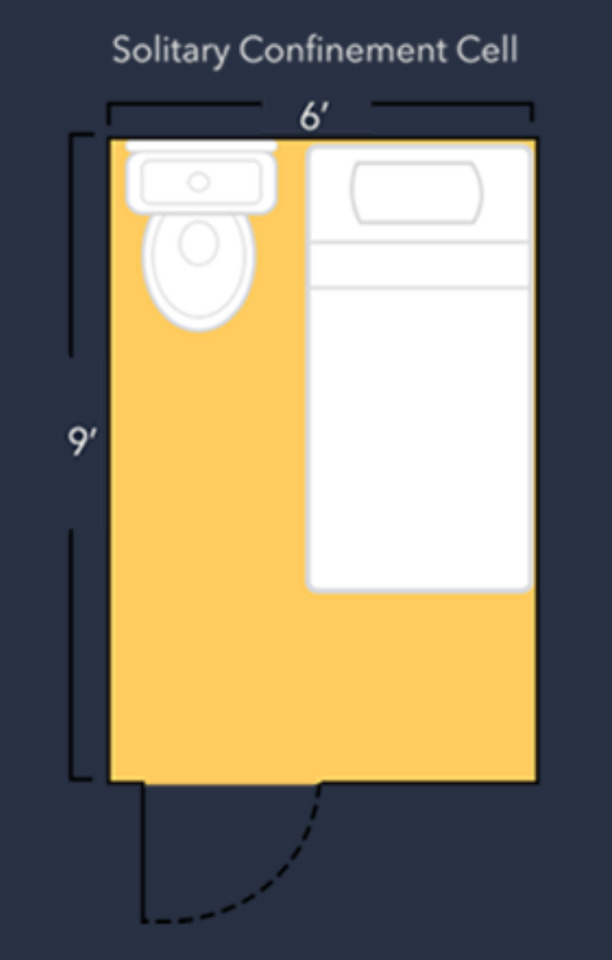

The only contact inmates typically receive when held within a SC cell is restricted to the prison guards that give them food through a smaller door built into the steel door that keeps them trapped.
SC’s conditions have SEVERE effects on both mental health and physical health.
The psychological effects of SC are as follows:
Anxiety / Paranoia / Obsessive thoughts
Aggression / Decline in impulse control
Depression / PTSD
Insomnia / Loss of Identity
Cognitive disturbances / Psychosis
Losing touch with reality
Increase risk of Self-harm and suicide
Hypersensitivity
The physical effects are as follows:
The shrinking of the hippocampus / Surges in the amygdala
Slowed brain activity / Worsening of intellect
Social Pain (Body translates this into physical pain)
Worsening of perceptual motor skills
Fewer/smaller/decreased connections of neurons
Fewer blood vessels in the brain
Hypertension / Increased heart rate / Shaking
Muscle atrophy / degradation of eyesight
Weakness / Loss of weight
To put it simply SC is designed to break its prisoners. Many of those who have been through SC have stated they would injure themselves to remind themselves that they are still real or even to force guards to enter the cells so that they could have a shred of human contact, even if it means being beaten by the guards and obtaining a longer sentence. Those who have gotten out have said the effects are long term and they have become afraid of being in open spaces or afraid of interacting with people.
There is no benefit to SC, it makes violent inmates worse and non-violent inmates can become aggressive.
Many inmates commit suicide within SC or eventually do so after release due to the resulting mental health issues. The United Nations declared SC for more than 15 consecutive days to be torture.
Now that you know what the conditions/effects of SC are, lets take a look at how that relates to the Prison Realm (PR).
We only have a single image of what the inside of the PR looks like.
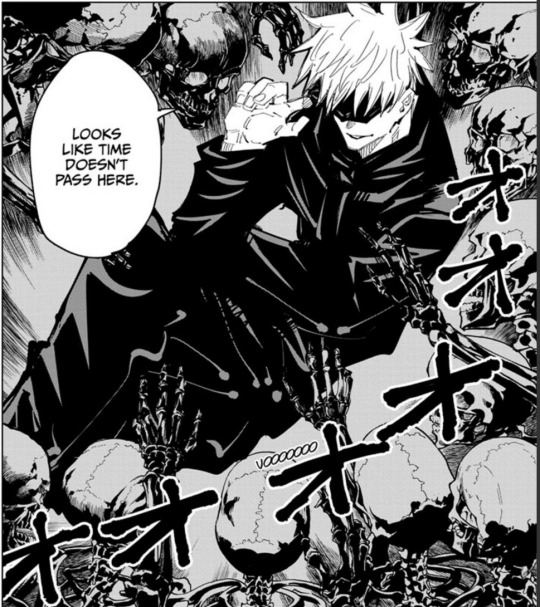
And just by this singular image you can immediately find similarities between the PR and SC:
Little to no room- While SC gives you at least a little room to walk around, the PR seems to have ZERO room for its inmate to move around in. Seemingly it contains its inmate within the dimensions of that persons body.
Complete isolation- The PR is a pocket dimension designed to completely separate its inmate from the rest of the world with absolutely no contact with the outside world or any other living beings.
No way to tell the time- Gojo states that time doesn't pass within the PR which means he will have no way of knowing how many hours, days or even years have passed while he’s contained within.
Kenjaku even tells us that like SC the PR can only contain a single inmate and that the only ways out of it is either by being released intentionally or by suicide. Considering the current known similarities its no wonder Jogo states that the PR is taboo.
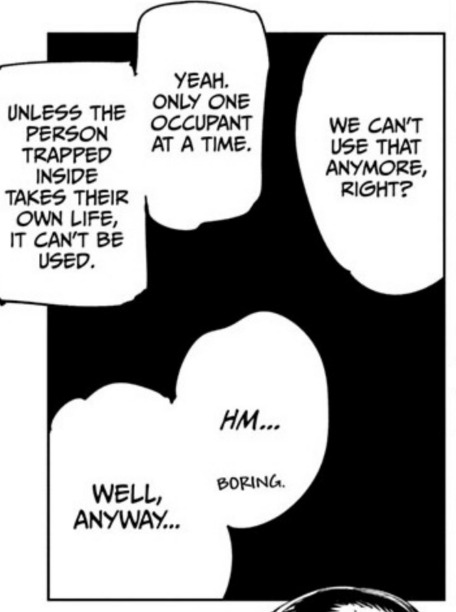
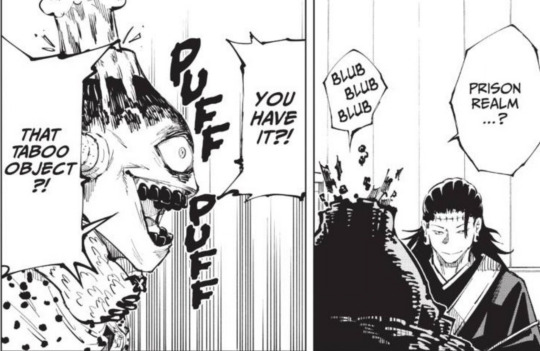
There's also symbolism that implies that Gojo wont be coming out of the PR the same as when he entered it.
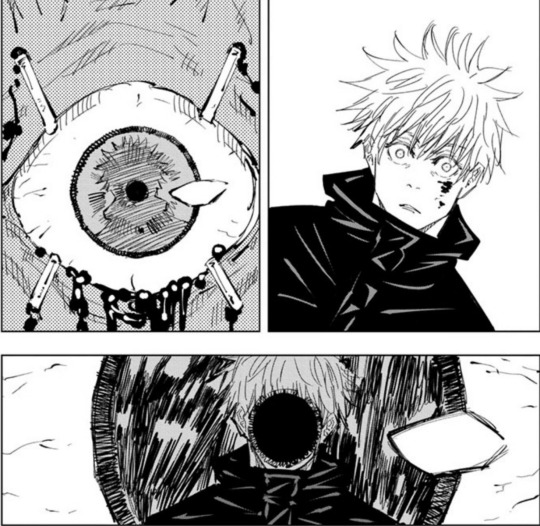
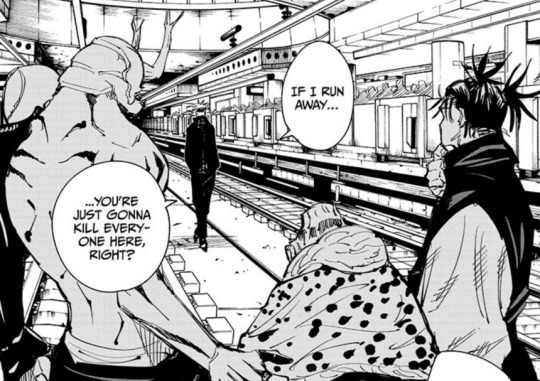
As an artist I can tell you that blotting out the face the way that the PR does to Gojo’s before his capture is something we use often to symbolize a few things. Its been used to show that someone is inauthentic (eyes are the window of the soul) and/or that that person is corrupted.
Trains are also a symbolism here since they can represent change and a transitional period.
One thing that I think shows that the PR has some sort of effect on its inmate is the fact that Kenjaku wants to one day release Gojo from it. Its become obvious that Kenjaku does everything simply due to scientific curiosity and I believe that this is no exception to that. If the PR does effect Gojo, Kenjaku would ABSOLUTLY want to release him to observe its effects.
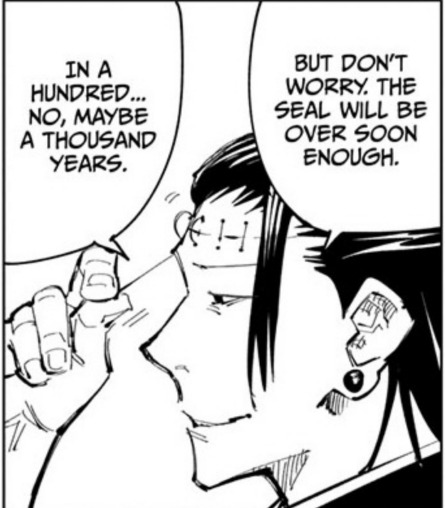

And if the PR effects Gojo the same way as SC would than it will be catastrophic.
Gojo has already shown signs of mental instability throughout the series. He’s unhinged when taking a fight seriously and seemingly had a manic episode during his rematch with Toji.
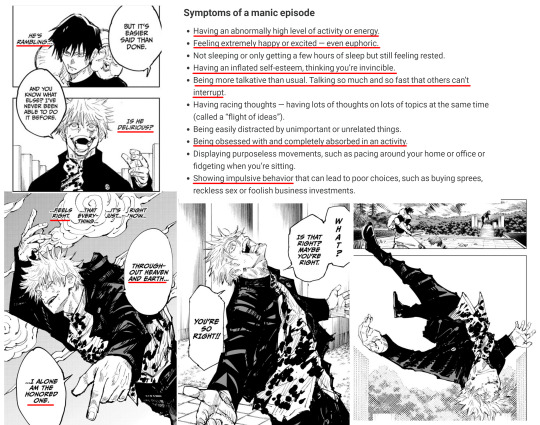
And after he kills Toji, when Geto finally arrives he seems to have started dissociating. Which he relies on Geto to help guide him and make the right choices.
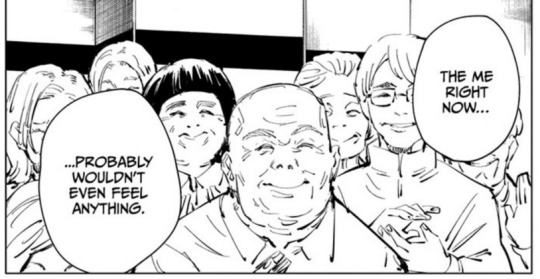

Gojo has also shown multiple times that he wants to simply kill all the higher ups and be done with them all.
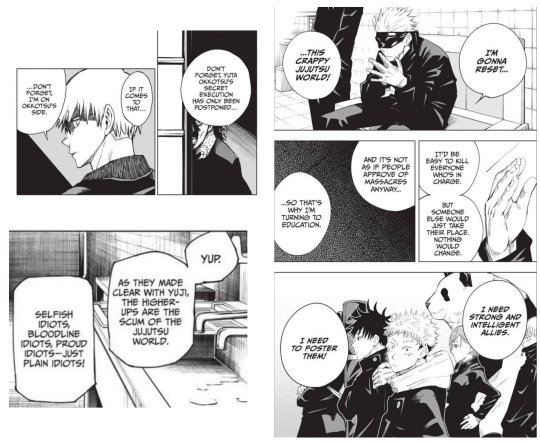
Jujutsu Kaisen has had many moments that discuss mental health, whether that be during Geto’s downfall, Yuta stating he attempted suicide or Yuji’s current declining mental health and willingness to die. Gege knows what he’s talking about and its abundantly clear that the PR is based off of SC.
This means Gojo is undoubtedly going to have serious issues when he’s finally released from the PR.
He’ll be more aggressive than ever, his impulse control will be fucked, he might come out of there hallucinating and unable to even tell what’s real. Which if all of this is the case there is NO chance that the higher ups wont be slaughtered. He already wanted to kill them before and now that most of his friends are dead, his students are mutilated, the higher ups have exiled him and finally him losing the two children its implied that he raised? I can’t imagine he won’t finally snap.
We’ve seen what happens to those jujutsu society deems worthless from both Maki and Toji. Maki murdered her entire clan and Toji became an unstable mess. It won’t be surprising if we will finally get to see what happens when they put ALL the expectations on someone. When they demand perfection.
Gojo has been able to pick himself back up every time something has gone wrong, but I don’t think he will be able to do that this time.
The higher ups at the very least will die, that I’m sure of; However, I think Gojo might take down both the Kamo and Gojo clan too. If he’s in such an unstable state he might just say ‘fuck it’ and kill everyone who had a hand in keeping their society the way it is.
Gojo has now been in the PR for 16 days. This exceeds the UNs limit of 15 days for being held in SC.
Another thing that I’ve begun to theorize while writing this is that it’s possible that with Gojo unable to tell how long its been inside the PR, what if the real world time he’s been imprisoned (3 years, 4 weeks) is how long he thinks he’s been imprisoned? Not sure if that will hold any weight but it’s definitely an interesting idea.
Edit: So a recent Q&A happened and...
This basically confirms everything that I said.
https://twitter.com/jacixn/status/1629947429901541377?t=dyu81gFSJzdZuGxefmQBAQ&s=19
#jjk#jujutsu kaisen#gojo satoru#kenjaku#theory#mental health#mentioned#suicide#selfharm#solitary confinement#prison realm#psychology#spoilers#manga spoilers#jjk 213#sort of#character analysis#feral gojo#torture#the prison realm is really gonna fuck gojo up
108 notes
·
View notes
Note
can you talk more about vinnie please?
But of course! But like, there's so much I can talk about, this ask is so vague, what do I say? I have been trying to reply to this ask for the past few days, since I got it actually, and each time my brain produces so many thoughts but they all are so incoherent because I get so excited I just say nothing and toss all those thoughts around in my head instead. So, I decided to just return to one of those things I at one or another point said I'd talk about later, and the first one that came to mind was dichotomy of Vinnie and Vincent. Iiii blame mlp Pinkie Pie/Pinkamena Diane Pie for this 100%, because the first time I heard about it I thought it was soooo cool so then when I found out that Vinnie is actually Vincent my neuron was activated and so a thought was born. Many many thoughts actually.
Let's try to organize it a bit then so we all know what on earth I'm talking about. First of all, I have to say that I can see it happening in two ways, either we give Vinnie DID (dissociative identity disorder) with Vincent being his different personality, or we simply do it Fun Russell style, it not being a different, completely separate personality but rather something that Vinnie himself did artificially, wanting to separate Vincent from Vinnie. Today, we'll be talking about the latter.
Ok, so, first of all, a few information that will be needed beforehand to understand what the hell I'm talking about, ones that I said before in posts and those are: Vinnie's actual name is Vincent (duh) and he was named that because his mother wanted her children to have smart and elegant sounding names because she dreamed of her children being smart and all that, so the name was to fit the personality. But Vincent never lived up to those expectations nor did he really want to, not with his mother being so metally abusive about it, this way she totally made studying and just school knowledge distasteful to him. Even after that he couldn't stop thinking about it, hearing this name that his mother put so much emphasis on made him feel so bad, so out-of-place, the name she was calling him - Vincent, was supposed to be someone studious, someone knowledgeable, someone he was not. This name didn't fit him at all after that. This was not his name. That was someone else's name. So he wanted to call himself something else, an alternative.
From here it can go different ways, maybe he himself found out that there is actually a nickname for Vincent that sounds much more him, or maybe someone else called him Vinnie just because or because it was easier on the tongue, if we want to be fun we can even say that Sunil was the first one to call him that.
And from that day on it just stuck. Vinnie - that felt like him, that was his name, not some fancy shmancy Vincent. From that day on, he almost completely rejected Vincent, yeah, it was his legal name and all but that's all, from that day on he always introduced himself as Vinnie, tried to change whoever was calling him Vincent from before to call him Vinnie, each time he had a new teacher in school he even tried to convince them to call him that, even in attendance or how he wrote his name on exams etc; many agreed (some of their own free will some because he kept annyoing them until they did) and so he was just knows as Vinnie, even in more formal situations as long as it was possible for him to arrange. If someone didn't know any better, they just assumed Vinnie is a full, legal name that he had, and also he was from a different country, so if wasn't hard for someone to think that maybe it's just a normal name in Italy.
At one point there was almost no visible trace of Vincent, there was only Vinnie, finally he changed what he fought for so long and so much.
Was that the end of Vincent? Well, no, not exactly, because Vinnie found a good use for him (at this point he simply saw Vincent as someone else, Vincent shared body with him, sure, but not mind. Vincent wasn't him, Vincent wasn't Vinnie, hence refering to Vincent per "him" not "me"). Well then, what did Vinnie do with Vincent? He made him into a scapegoa, an ultimate fission! If there was something he did or felt he didn't like he could always tell himself that it wasn't really him, it was Vincent. Vincent showed sadness when he didn't want to, Vincent was the one who lost control when angry, he was the one who couldn't get a grip on himself, he was the one with any sort of problems. Not Vinnie, Vinnie didn't have problems and he certainly didn't need any help, Vincent did, Vincent was a crybaby who could not handle anything. Not Vinnie though, Vinnie could handle anything without asking for help or complaining, Vinnie was known for being chill, laid-back and going with the flow, and that's what he would fight to be seen as. It's just a shame that sometimes he sees Vincent's face when he looks in the mirror instead of his own.
You know?
7 notes
·
View notes
Text
I'm tired of this boom of plural trend.
Hello, I'm Dante and I'm a DID patient. I won't go into details of myself, because I think it's something really important that we need to talk about it.
DID, OSDD and UDD are a fad and I discussed this with another DID patient. We're not both american or English speakers, so I'll speak from my vision of the issue of plurality in Latin America and other Spanish-speaking spaces. Since content creators like Long Soul System, Empire System, etc. (most with evidence of being fakers) has become popular, the whole issue of neurodivergence, and plurality specifically, has had a massive boom.
DID, and the others, isn't a roleplay or romanticizable topic. As I write this, my head hurts. They're disorders that exist because the brain of a kid can't find another way to survive. You're not a “system” for wanting friends in your head and role-playing as your OC's.
Many want to live a life with a fragmented identity, when it's impossible. If you're not the host or the core, you're an alter stealing their life, you shouldn't exist and yet you want to have a life all to yourself. From experience, it's impossible, you can't have your own life without being the host or the core, because we already have a life made up.
Oh, and yeah, there's an original/core. Structural dissociation theory is just that, A THEORY. There was a first, very basic, identity, which was the one that fragmented. That's the core, the original. Switches and splits kill neurons, dissociative disorders that include alternate identities gradually kill the brain and damege it, in addition to increasing the risk of having a stroke or cerebral palsy in the process. Splitting and fragmentation doesn't happen because you were called a “faker” or because you're hyperfixated on something, it only happens when there's too much stress/panic/anxiety or, directlydirectly, another trauma.
The alters don't “arrive” with an entire created identity, much less with a role, which is the same in all alters: taking care of the body.
Before 2022, NO ONE was a “system” (which isn't even a medical term), but since the boom, everyone is now neurodivergent or plural, it wasn't even known what's was a dissociative disorder. A dissociative disorder with alters is too complex, if diagnosing it's very difficult for a professional, what will a 13 or 14 year old child do?
The terms ‘introject’ and ‘brainmade’ are useless. All alters are created by the brain, whether based on a fictional character (or real person) or not. And ‘singlet’ ... Why do you need a term to talk about someone who wasn't terribly traumatized as a kid? And sometimes it's used as a derogatory term. The term “blurry” is used to speak when you don't know who is fronting. Why do you need a term for something that is common in your supposed disorder? And it's practically obligatory when there are dissociative disorders with alters...
Fictives/factives are a real and big problem. They exist, of course, but many times attachment to the “source” is encouraged (which doesn't exist because its “source” is the brain) in something called “sourcecalls”, they're calls to alters of the same source. That's anti-recovery, in addition to delaying the progress of integration and pigeonholing the alter to just being an ‘introject’ or believing it to be the same as the real character/person.
Sub-systems are stupid. According to, there are two types: when an alter has DID as well and when a group of alters consider themselves family. First, alters consider themselves family, siblings, partners or whatever, it's anti-recovery because affection is generated between alters. The second... do they still believe that each alter has a different brain? If another alter really had DID, a lot of brain activity would be needed and, practically, the days of that body would be counted down. And, there's not enough research or scientific evidence of these sub-systems.
The alters can't have different disorders among themselves (only the behavioral type), they have the same body and brain. A container/retainer alter, is just that, contains the symptoms of certain disorders, that is, they affect them more, but it affects the rest of the alters, either to a greater or lesser extent. Alters can't die, only enter a dormant state. A part of your brain simply can't die, and if it did, it would probably cause some type of mental retardation or cerebral palsy.
HC-DID and polyfragmented DID are terms that they know nothing about. If someone has more than 10 alters, is considered polyfragmented or highly complex medically, without having more than 5000 (or even “infinity”) alters; with that amount of alters, you would be dead or in a psychiatric hospital being investigated.
“I'm medically recognized as a system” ... That doesn't mean you really are one. Factitious disorder exists, medical mistakes and confusions exist. Furthermore, even if you're recognized, the diagnosis process is too long and Things that could supplant the diagnosis must be ruled out.
Plural or trauma validation is just a bunch of shit. Why do you want to be validated for a disorder that disables every aspect of your life? Or for something that's literally a fucking trauma? Fakeclaim is also a problem but.. in a reverse way. If you're diagnosed, why is it annoying that they say you don't have a disorder? I understand that it can be frustrating because you feel like your experience is invalidated, but fragmenting yourself because of that? Impossible. And with self-diagnosed: If you really did extensive research and know that you could have a disorder, why fakeclaim gives you an anxiety attack? Is the same as above.
Simply Plural, Tupperbox and/or Plural Kit are anti-recovery and 0 disability tools. Why? 1: because it encourages the separation and attempt at independence of each alter. 2: because they aren't essential for a patient with DID. It's impossible to register the switches or to all alters, simply because an exact amount can't be affirmed or denied. I wonder if someone with a true dissociative disorder can have such organized SP/PK/TB profiles, full of information about each alter (impossible) and aesthetic. Oh, and they also use PK/TB for each of their 10-second switches so “each alter has its own life” (impossible and anti-recovery). The alters are not there so that everyone has their own life, they're tools of the defense mechanism, they must take care of the host/original, help them return to their normal life (integration therapy), not seek their own life (because it's impossible and risky for the body). “But my therapist told me that PK can help me integrate!!”, well, YOUR THERAPIST. This is only achieved when there's support and monitoring from a professional.
Have you ever met an OSDD-1A or UDD system? I don't, because the way they describe them, don't support their idea of a fantasy system, where everyone is friends. Ah, and OSDD1-A/1-B aren't even clinical terms. There are only OSDD1-B systems because there's no amnesia and great communication between alters, while in OSDD1-A this is not the case.
Alters don't have birthday. Alters have the same age as the brain and body, it doesn't matter if they say they're 4, 38 or 1000 years old. Alters only know the languages that the brain knows, not because you have a Russian alter, they will magically speak Russian. Alters are part of yourself, you don't need to break your vocal cords faking voices or accents. Alters can't be formed after some media gets popular, they get the host and, after two weeks, they go dormant. If you have an Asian alter or one from a closed culture, it doesn't mean that you're one of them too, the same with minority alters and slurs, it just doesn't work like that. Alters simply can't get along with each other, have the same tastes or ways of speaking, is DID a disorder that hides by forming similar identities between them? Yes, but they aren't alteregos or moods so that they're exactly the same as you.
Frontcalls are dangerous and anti-recovery. “Plural security/privacy” and alters are publicly listed on Internet.
Littles aren't real kids, neither physically nor mentally, they just have age regression. Why do they let their littles be frontig on the Internet? Ridiculous and dangerous for them.
All alters, magically, need pronouns, a name a hyperspecific role, picrew, presentation, profile in SP/PK and some lgbtq+ label. Giving alters so much individuality is anti-recovery. Alters can become useless over time, just a reminder.
One of the important features of dissociation is amnesia, so knowing things about another alter is impossible and fake. No trauma? Then you're not a system. Do you have a mixed origin? Still A F*CKIG TRAUMA. Alters can't fusionate or go dormant without psychological help or a lot of mental stress involved. Yes, the disorder is never the same in all patients, but all TikTok systems are a copy and paste of each other.
Non-human alters claim not to understand humans, but they use our colloquial expressions. The persecutors are not bad, yes, but when they do something horrible, they always try to justify them.
Plural responsibility exists, but not all alters should be put in the same bag as the alter responsible, and the most sensible thing is to apologize on behalf of the entire system. Plural pronouns only take away your individuality as a person, but we know that those are very complex topics for kids who are just leaving elementary school.
The “plural” spaces, the “plural” community, are b*llshit. They're anti-recovery spaces, with Pluralpedia as real or veridical resources and children whose entire personality is having DID. In which integration therapy and the original are demonized; where it's about glorifying and romanticizing the disorder. The disorder is not “I identify”, it's a painful reality.
“Syscourse”, “sysmed” aren't real or valid terms. They only exist so that fakers can make excuses for themselves.
I'm sorry if I sounded very annoying or rude at one point, but it bothers me that privileged little children dedicate themselves to falsifying something as painful, physically and mentally, as DID. Thanks for reading me and sorry, again, if some parts of my English are bad or inaccurate.
7 notes
·
View notes